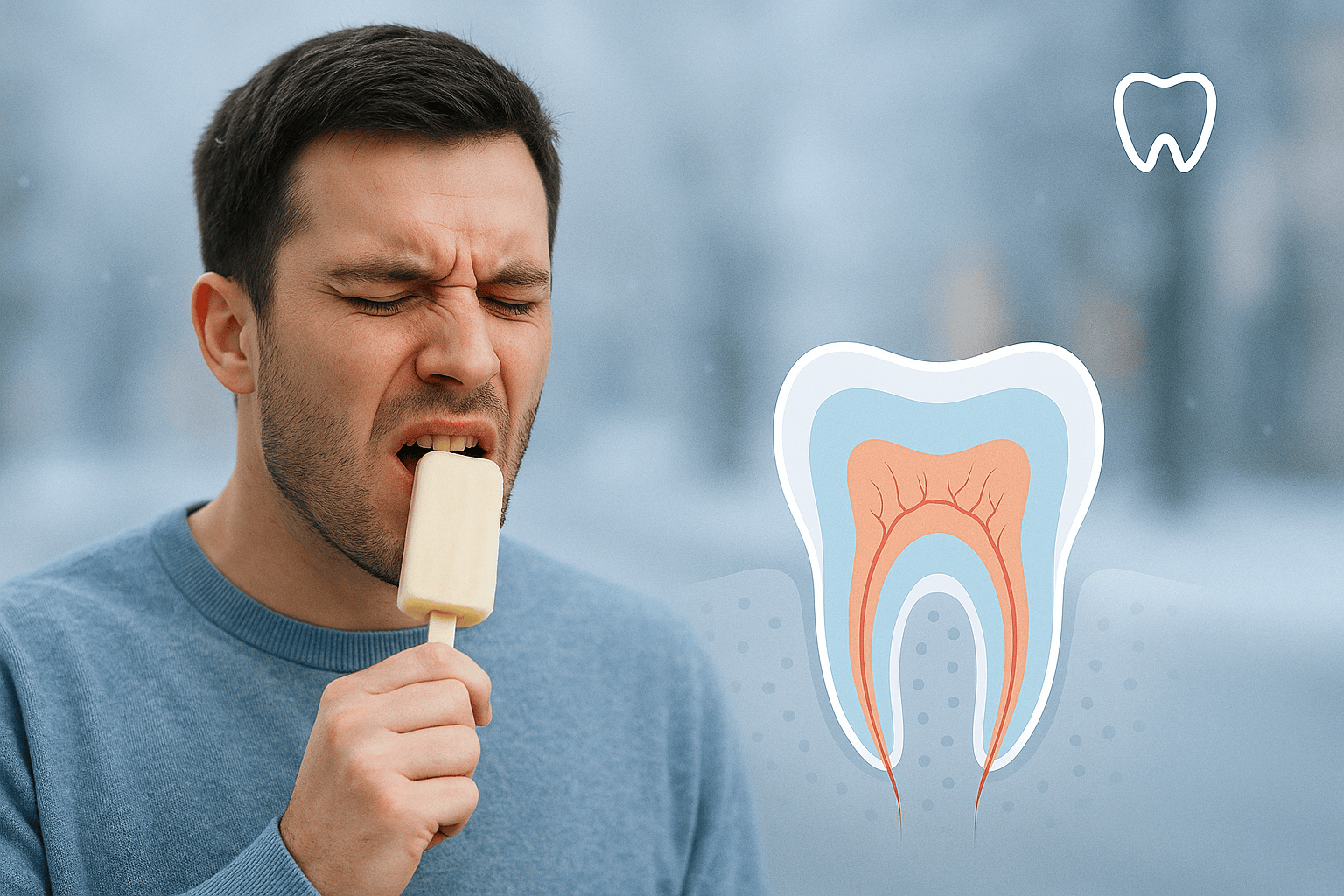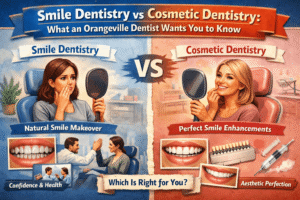Experiencing a sharp, sudden pain in your teeth when you bite into something cold, sip a hot drink, or even just inhale crisp Orangeville air? You’re not alone. This common discomfort is known as tooth sensitivity, or dentin hypersensitivity, and it affects millions of adults, often between the ages of 20 and 50. While it can be frustrating, understanding its causes and how to manage it can bring much-needed relief.
At Viva Dental Orangeville, we’re dedicated to helping you achieve optimal oral health and comfort. Let’s explore why your teeth might be sensitive and what you can do about it.
Understanding How Tooth Sensitivity Occurs
Beneath the hard enamel protecting your teeth is a layer called dentin. Dentin is made up of thousands of tiny tubes, or tubules, that lead directly to the tooth’s nerve center (the pulp).
When enamel is worn away or gums recede, these tubules become exposed.
Triggers like hot, cold, sweet, or acidic foods and drinks, or even cold air, can travel through these exposed tubules to the nerve, causing that familiar jolt of pain.
Think of your tooth like a protective shield (enamel) covering a sensitive core (dentin and pulp). When the shield is compromised, the core reacts to external stimuli.
Common Causes of Tooth Sensitivity in Orangeville
Several factors can lead to the exposure of dentin and subsequent sensitivity:
- Worn Enamel: This is a primary culprit. It can happen due to:
- Aggressive Brushing: Using a hard-bristled toothbrush or brushing too forcefully wears down enamel over time.
- Acidic Foods and Drinks: Regularly consuming items like citrus fruits, sodas, and vinegar can erode enamel.
- Teeth Grinding (Bruxism): Clenching or grinding your teeth wears down enamel and can chip teeth.
- Acid Reflux or Eating Disorders: Conditions causing frequent vomiting bring stomach acid into contact with teeth, eroding enamel.
- Receding Gums: When gums pull away from the teeth, the softer root surface (which is covered by cementum, thinner than enamel, and contains dentin) becomes exposed.
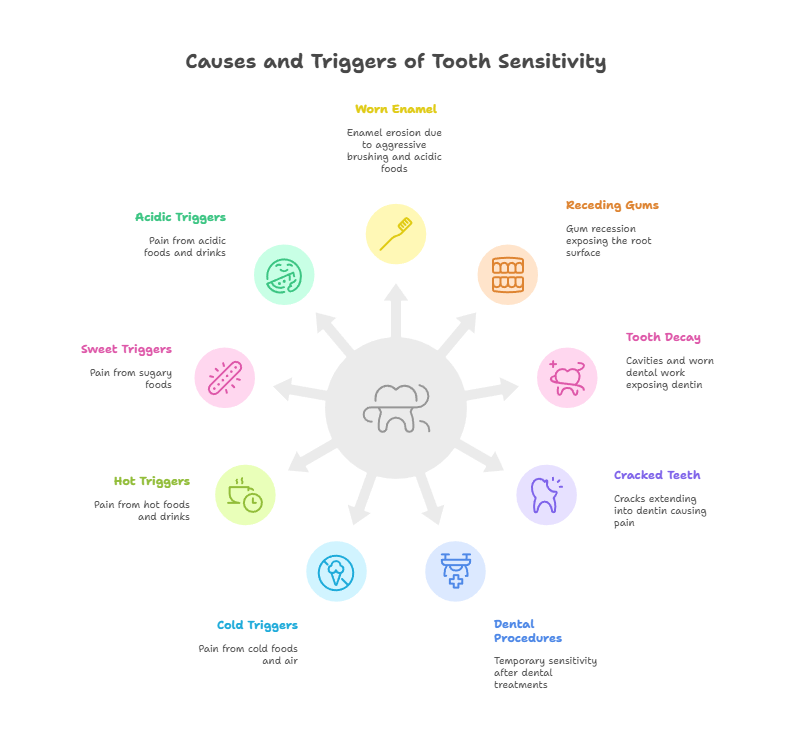
Gum recession can be caused by:
- Aging: Gums naturally recede slightly over time.
- Gum Disease (Periodontitis): This inflammatory condition can cause gums to pull away from the teeth and even damage the bone supporting the teeth.
- Improper Brushing Technique: Brushing too hard, especially horizontally, can injure gum tissue.
- Tooth Decay, Cavities, and Worn Dental Work: Cavities are areas of decay that expose the underlying dentin. Old or worn fillings and crowns can also become loose or cracked, creating pathways for stimuli to reach the nerve.
- Cracked or Chipped Teeth: Cracks can extend into the dentin or even the pulp, causing significant sensitivity and pain, especially when biting pressure is applied.
- Recent Dental Procedures: It’s common to experience temporary sensitivity after treatments like professional cleaning, teeth whitening, or orthodontic adjustments. This usually subsides within a few days or weeks.
Common Triggers: What Makes Your Teeth Hurt?
While the underlying cause is dentin exposure, certain stimuli are more likely to trigger the pain:
- Cold foods and drinks (ice cream, cold water)
- Hot foods and drinks (coffee, soup)
- Sweet foods
- Acidic foods and drinks (citrus, vinegar-based dressings)
- Cold air
- Brushing or flossing (especially near the gum line)
Immediate Relief: Stopping the Pain Now
When sensitivity strikes, you want relief fast. Here are some steps you can take for temporary comfort:

- Apply Desensitizing Toothpaste: Gently rub a small amount of desensitizing toothpaste directly onto the sensitive area with your finger or a cotton swab after brushing. Leave it on for a few minutes before rinsing. Many desensitizing toothpastes contain ingredients like potassium nitrate, which helps block the pain signal, or stannous fluoride, which helps plug the dentin tubules.
- Rinse with Saltwater: A warm saltwater rinse (1/2 teaspoon of salt in a glass of warm water) can help reduce inflammation and provide temporary relief. Swish it around your mouth for 30 seconds and then spit.
- Avoid Triggers: While it sounds simple, consciously avoiding very hot, cold, sweet, or acidic items can prevent painful episodes.
- Consider Over-the-Counter Pain Relievers: Ibuprofen or acetaminophen can help manage the pain, but they don’t address the sensitivity itself. Use as directed.
(Note: Home remedies like clove oil are sometimes mentioned, but their efficacy for sensitivity is limited and temporary. Always prioritize methods recommended by dental professionals.)
Long-Term Management & Prevention
Addressing tooth sensitivity effectively requires a long-term approach, often involving changes to your oral hygiene routine and potentially professional treatment.
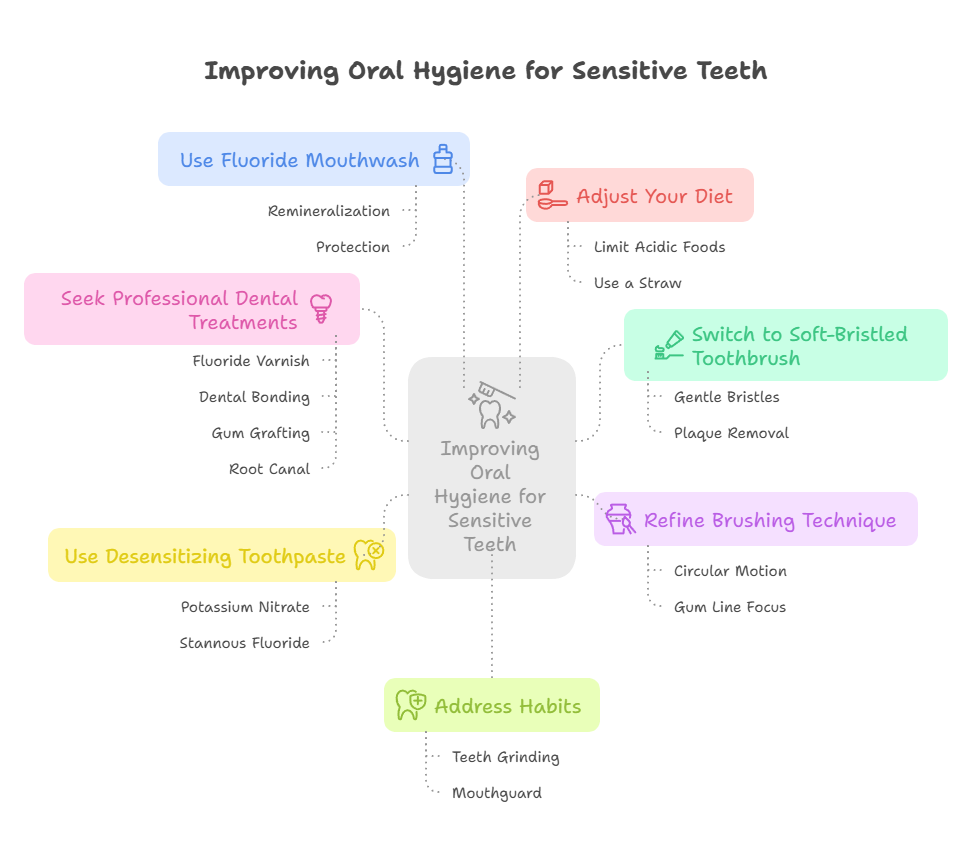
Improve Your Oral Hygiene:
Switch to a Soft-Bristled Toothbrush: This is crucial if aggressive brushing is a factor.
- Refine Your Brushing Technique: Brush gently in a circular or up-and-down motion, rather than scrubbing back and forth, especially along the gum line.
- Use Desensitizing Toothpaste Daily: Consistent use is key for effectiveness. Ingredients like potassium nitrate interfere with nerve signals, while stannous fluoride helps block the dentin tubules. Look for the Canadian Dental Association (CDA) Seal of Acceptance.
- Use Fluoride Mouthwash: Fluoride helps strengthen enamel and dentin, potentially reducing sensitivity.
- Consider teeth whitening services once a year to regain the natural color of your teeth.
Schedule an appointment with dentist for a regular checkup. Find out why regular dental checkup is absolutely important.
Adjust Your Diet:
- Limit Acidic and Sugary Items: Reduce consumption of sodas, fruit juices, sports drinks, citrus fruits, candies, and acidic sauces.
- Use a Straw: When drinking acidic beverages, use a straw to minimize contact with your teeth.
- Rinse with Water: After consuming acidic foods or drinks, rinse your mouth thoroughly with plain water to neutralize acids. Wait at least 30 minutes before brushing to avoid brushing acid into your enamel.
- Include Enamel-Strengthening Foods: Dairy products (cheese, milk, yogurt), leafy greens, and lean proteins rich in calcium and phosphorus can help strengthen enamel.
Address Habits:
If you grind or clench your teeth, discuss it with your dentist. A custom-fitted mouthguard can protect your teeth, especially while sleeping.
- Seek Professional Dental Treatments: Your dentist can offer various in-office solutions:
- Fluoride Varnish or Gel: Applied to the sensitive areas, fluoride strengthens enamel and blocks tubules.
- Dental Bonding, Sealants, or Varnishes: These materials can be applied to cover exposed root surfaces.
- Gum Grafting: In severe cases of gum recession, a minor surgical procedure can cover the exposed root surface.
- Root Canal: If severe sensitivity is caused by problems with the tooth’s pulp, a root canal may be necessary to remove the damaged nerve.
When to See Your Dentist in Orangeville?
While many cases of sensitivity can be managed with home care, it’s essential to see your dentist if:
- The sensitivity is severe or persistent.
- It affects only one tooth.
- You notice visible signs of decay, gum recession, or a cracked tooth.
- Home care measures don’t provide relief.
Sensitivity can sometimes indicate a more serious underlying issue that requires professional diagnosis and treatment.
At Viva Dental Orangeville, Dr. Rakhshanfar and our skilled team can identify the exact cause of your sensitivity and recommend the most effective treatment plan for your unique needs.
Conclusion: Enjoy Your Favorite Flavored Ice Cream
Tooth sensitivity is a common and often manageable issue. By understanding the causes, practicing good oral hygiene, making smart dietary choices, and seeking professional care when needed, you can significantly reduce discomfort and enjoy your favorite ice cream and drink again. Don’t let tooth sensitivity hold you back from smiling confidently. If you’re struggling with sensitive teeth, schedule a consultation at Viva Dental Orangeville today.
We’re here to help you find comfort and maintain a healthy, happy smile.
Frequently Asked Questions About Tooth Sensitivity
Q: Why does my tooth sensitivity seem worse in the winter?
A: Cold air can be a significant trigger for exposed dentin. Breathing in cold air through your mouth can cause immediate pain.
Q: Can teeth whitening cause sensitivity?
A: Yes, temporary sensitivity is a common side effect of teeth whitening treatments. This usually resolves within a few days or weeks after the treatment is completed. Your dentist can recommend products to help manage this sensitivity.
Q: How long does it take for desensitizing toothpaste to work?
A: You may notice some improvement within a few days, but it typically takes about two weeks of consistent, twice-daily use to experience significant relief. For best results, use it long-term as your regular toothpaste.
Q: Is it possible for sensitivity to go away on its own?
A: If the sensitivity is due to a temporary cause like recent dental work, it may resolve on its own. However, if it’s due to underlying issues like worn enamel, receding gums, or decay, it’s unlikely to disappear without addressing the cause. In some cases, the dentin tubules can become naturally blocked over time, reducing sensitivity, but this is not guaranteed.
Q: Should I avoid brushing sensitive teeth?
A: Absolutely not. Good oral hygiene is crucial. Instead of avoiding brushing, ensure you are using a soft-bristled brush and a gentle technique. Using desensitizing toothpaste as part of your routine will help reduce sensitivity while maintaining cleanliness.





